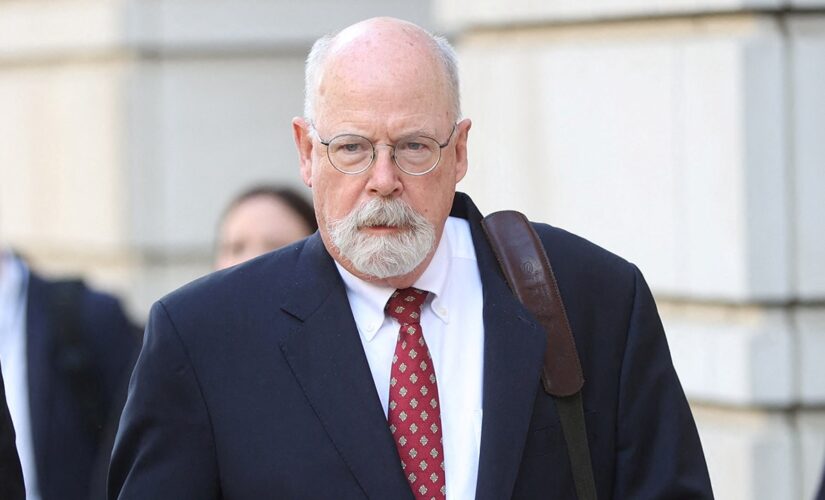Special Counsel John Durham delivered the prosecution’s final rebuttal in the trial of Igor Danchenko Monday, pointing to the significance of information that emerged during the proceedings of FBI failures related to the Trump-Russia probe.
Though it is Danchenko who is on trial, the FBI is the “elephant in the room,” Durham said.
Durham’s comment came as he wrapped up his effort to prove that Danchenko, the Russian national who served as the primary sub-source for the anti-Trump dossier, had lied to the FBI.
“Let’s talk about the elephant in the room,” Durham said. “The FBI.”
“The FBI failed here on a number of occasions,” Durham said.
General view of the J. Edgar Hoover F.B.I. Building in Washington, U.S., March 10, 2019. REUTERS/Mary F. Calvert
(Reuters/Mary F. Calvert)
During the trial, Durham’s questioning revealed that neither the FBI nor any U.S. intelligence agency had any corroborating information to confirm allegations in the anti-Trump dossier.
Special Counsel John Durham.
(REUTERS/Julia Nikhinson)
The dossier, which Danchenko contributed to, was authored by ex-British intelligence officer Christopher Steele, commissioned by opposition research firm Fusion GPS, and paid for by the Hillary Clinton campaign and the Democratic National Committee through law firm Perkins Coie.
JUDGE THROWS OUT ONE OF FIVE COUNTS AGAINST DANCHENKO
The now-debunked and uncorroborated dossier served as the basis for a Foreign Intelligence Surveillance Act (FISA) warrant and subsequent renewals against Trump campaign aide Carter Page.
Government prosecutor Michael Kielty delivered closing arguments Monday, stressing that the government has “proven its case beyond a reasonable doubt.”
“We have met that burden,” Keilty said.
Durham charged Danchenko last year with five counts of making false statements to the FBI related to the dossier.
FBI PAID IGOR DANCHENKO MORE THAN $200,000 TO SERVE AS CONFIDENTIAL HUMAN SOURCE
U.S. District Judge Anthony Trenga acquitted Danchenko on one of five counts against him last week.
Count One had alleged that Danchenko lied to FBI Special Agent Kevin Helson when he said he had not “talked” to longtime Democratic operative and PR executive Charles Dolan about information that went into the Steele Dossier.
Durham’s team is trying to convince the jury that Danchenko lied when he said he obtained information in an anonymous phone call from a man he thought was Sergei Millian– a former head of the Russian-American Chamber of Commerce. Durham’s team says Danchenko never spoke with Millian and said phone records show he did not receive an anonymous phone call at the time Danchenko said it occurred.
Igor Danchenko, the primary sub-source for the Steele dossier, was indicted as part of Special Counsel John Durham’s investigations into the origins of the probe into whether the Trump campaign colluded with Russia to influence the 2016 presidential election.
(AP Photo/Manuel Balce Ceneta))
Danchenko’s attorneys argued that their client didn’t make a false statement, because, technically, they never did speak, but rather, corresponded through email.
Keilty on Monday urged jurors to use their “common sense.”
DURHAM PROBE: FBI OFFERED CHRISTOPHER STEELE $1 MILLION TO CORROBORATE TRUMP ALLEGATIONS IN DOSSIER
“It is hard to keep track of lies,” Keilty said. “Use your common sense, there was no call.”
Keilty stressed that the information Danchenko allegedly received “was used in a FISA warrant against a U.S. citizen.”
Keilty characterized a FISA warrant as “one of the most intrusive tools available to the FBI.”
“They can listen to your calls and read your emails,” Keilty said. “The FBI surveilled a U.S. citizen for nearly a year based on that information.”
Christopher Steele authored the infamous anti-Trump dossier.
(Photo by TOLGA AKMEN/AFP via Getty Images)
Danchenko attorney Stuart Sears delivered the defense’s closing arguments, telling jurors that Danchenko told Steele all along that the information he was delivering for the dossier was “a mix of news and speculation.”
Sears said Danchenko was “shocked and upset” that Steele had represented his information in the dossier as fact.
Sears also reminded the jury that Danchenko had served as a valuable and “trusted source” for the FBI from 2017 to 2020.
As for the phone call, Sears said Durham’s team has “no evidence that there was no call on a messaging app” that wouldn’t show up on traditional phone records.
“That’s their burden,” Sears said. “He tried to help the FBI from the time he met them in January 2017 until they exposed him.”
“Apps wouldn’t show up in records,” Sears said. “They haven’t proved it. They are distracting you with conjecture and speculation.”
Sears added: “They’re argument is speculation. They have not and cannot prove that he lied.”
Due to the possibility of Danchenko’s call with Millian taking place over a phone app versus a traditional phone line, Sears said Durham’s team has a “giant hole in their case and they can’t fill it with conjecture and argument.”
“Where’s the evidence?” Sears said.
The jury is now deliberating.
Meanwhile, during trial, it was revealed that the FBI offered Steele $1 million to corroborate allegations contained in his dossier. Steele was not able to do so.
It was also revealed that the FBI paid Danchenko more than $200,000 to serve as a confidential human source for the bureau during the Trump-Russia investigation–beginning in 2017 through October 2020.
Durham has been investigating the origins of the FBI’s original Trump-Russia investigation, known inside the bureau as “Crossfire Hurricane,” since April 2019.
Durham was tapped to lead the investigation after Special Counsel Robert Mueller’s nearly two-year-long investigation yielded no evidence of criminal conspiracy or coordination between the Trump campaign and Russian officials during the 2016 presidential election.




